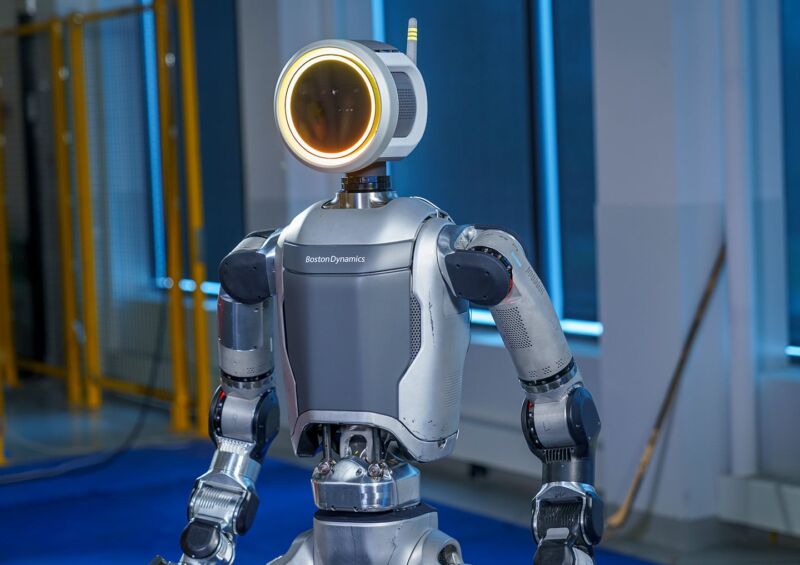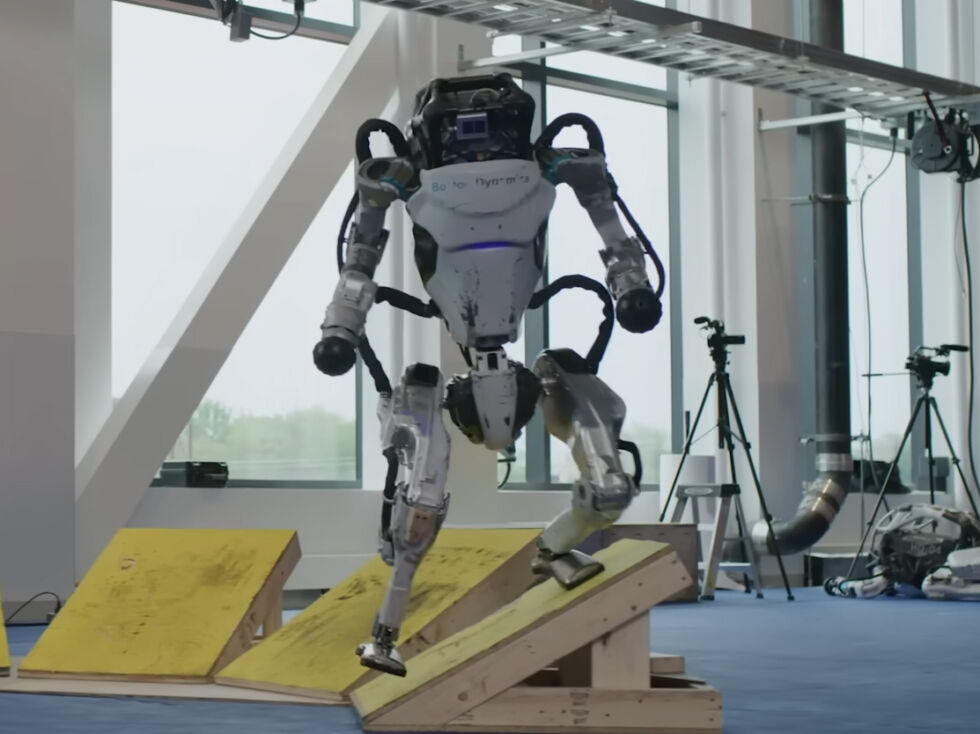
Boston Dynamics
The humanoid robotics market is starting to heat up, and the company that’s been doing this the longest isn’t going to sit by and watch. Boston Dynamics has a new humanoid robot that the company says represents a path to commercialization. It’s the company’s next-generation, all-electric “Atlas” robot.
While new Atlas and old Atlas share a name, they couldn’t be more different when it comes to construction. The old Atlas—a research platform and viral sensation that could handle nearly any terrain, do backflips, and pick up heavy objects—was powered by a heavy, complicated hydraulics system. The new Atlas is all-electric and looks like it’s a fraction of the size and weight of the hydraulic version. It also looks like a product, with covers around all the major components and consumer-friendly design touches like a giant status light in the head and a light-up power button that looks like it was ripped right from the Spot assembly line.
Hydraulic Atlas is being retired to make way for the all-electric version. The company posted one last goodbye video for the hydraulic model on its YouTube page, showing the history of the project. Atlas has done a lot of neat tricks over the years, but getting there has required a lot of learning—part of that is taking some absolutely gnarly slams, which are highlighted in the video. The video seemed to go out of its way to show just how cumbersome hydraulics can be. At one point, it looks like Atlas’ foot completely breaks off, and hydraulic fluid gushes all over the floor. Other times, the robot just springs a leak, and a fine mist of high-pressure fluid sprays everywhere as the robot goes limp. The fluid has a red tinge to it, so with a little imagination, it can look pretty gory!

Boston Dynamics
Look at any clear picture of old Atlas, and you will see a constantly wobbling halo of thick, black hydraulic lines hanging all over the robot. Two lines come out of the backpack and form big hoops around the shoulders, running down the arms to the hands. Two more hoses come out of the bottom of the backpack around the robot’s hips and run down either leg.
The new Atlas removes that complicated and messy hydraulic system. We only get a 30-second look at the new robot, but it shows off some impressive capabilities. It seems like a basic thing, but have you ever seen a humanoid robot stand up? Atlas can do it, and probably in the creepiest way possible. The body is lying face down, and the legs swing up into the air, backward, and get placed down to the left and right side of the robot’s butt in a crazy contortionist’s pretzel position. Both feet get placed flat on the floor, and the robot completes the deepest squat you’ve ever seen, with the hips rotating something like 270 degrees.
From there, the robot’s body is facing away from the camera (we’re not worrying about the head just yet), and then it does the wildest robot turn-around you’ve ever seen. Just below the hip joint, there is another 360 joint in the thigh with no human analog, allowing each leg to longitudinally spin around. So, without moving the hips or robot body at all, the right leg does a 180 spin in place and goes from “knees and toes pointing away from the camera” to “knees and toes pointing at the camera,” and then the left leg does the same. Then the whole torso does a 180 and suddenly the robot is facing a different direction. It’s a zero-radius turnaround, but even that doesn’t seem like an adequate description.
Besides it being creepy to see anything move like this, there’s a point to the madness. This kind of movement would be impossible with hydraulic lines hanging all over the place. Every movement of the old Atlas needed to be made with the limitations of the hydraulic line spaghetti in mind. Move a limb too far, and you will rip a line off and spray fluid everywhere. Just like a human, every joint had a “home” position that you needed to return to, so that everything untangled.
There’s no need for any range-of-motion limits with electric joints. While the knees of the robot look normal, it looks like the head, torso, hips, shoulders, and thigh spinners all look like limitless 360-degree joints. With things like slip rings that can pass electrical wires to a rotating object, all these joints can probably just spin forever and have no home position. Boston Dynamics is calling the new Atlas the “world’s most dynamic humanoid robot.”




















+ There are no comments
Add yours